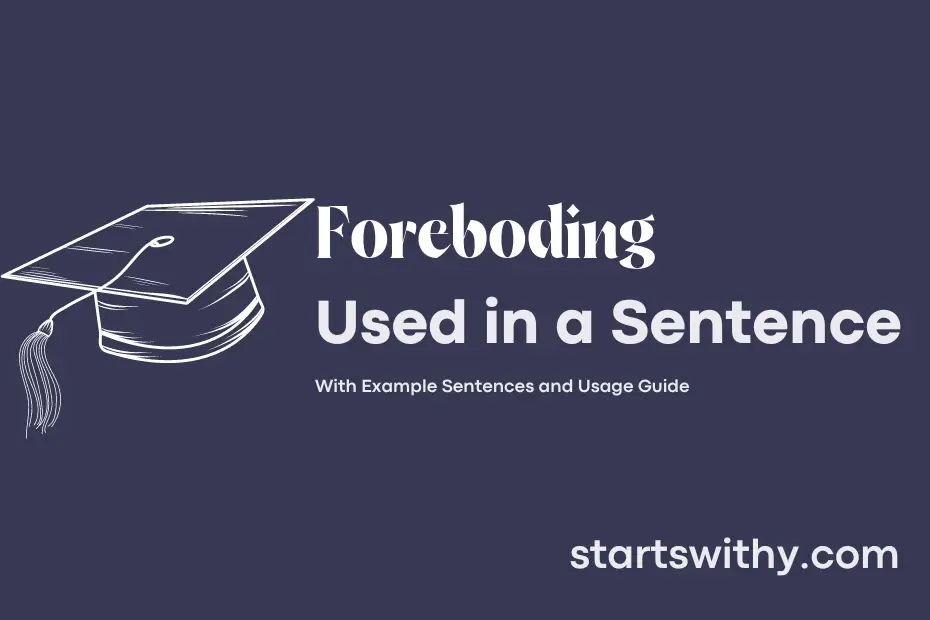Have you ever experienced a sense of foreboding when entering a dark alley or hearing a strange noise late at night? Foreboding is a feeling of impending doom or misfortune, often accompanied by a sense of uneasiness or dread.
This ominous sensation can be triggered by various circumstances, such as eerie surroundings, unsettling news, or even a simple gut instinct. Understanding how to recognize and address feelings of foreboding can be a valuable skill in navigating uncertain or potentially dangerous situations.
7 Examples Of Foreboding Used In a Sentence For Kids
- Foreboding clouds in the sky mean it might rain soon.
- I felt a sense of foreboding when I heard a loud noise outside.
- The dark and spooky forest had an air of foreboding about it.
- The old house gave off a feeling of foreboding as we approached it.
- The howling wind created a feeling of foreboding in the night.
- The shadowy figure in the distance caused a sense of foreboding in me.
- The sudden silence in the room filled me with a sense of foreboding.
14 Sentences with Foreboding Examples
- As the dark clouds rolled in, a sense of foreboding settled over the college campus.
- The sudden power outage during the exam created a feeling of foreboding among the students.
- The professor’s cryptic comment about the upcoming assignment filled the students with foreboding.
- Hearing rumors about a possible campus lockdown cast a shadow of foreboding over the student body.
- Waking up to the sound of thunder in the distance, the students felt a sense of foreboding about the upcoming outdoor event.
- A mysterious package left outside the dormitory sparked foreboding among the college students.
- The eerie silence in the library late at night evoked a feeling of foreboding in the students studying there.
- The sight of a black cat crossing their path on the way to class filled the students with foreboding.
- The sudden cancellation of a popular event on campus created a sense of foreboding among the students.
- The professor’s ominous tone when discussing the upcoming quiz set off foreboding in the students.
- Discovering a strange symbol drawn on the classroom chalkboard left the students with a sense of foreboding.
- A series of unexplained disappearances in the area led to a feeling of foreboding among the college students.
- The stern look on the dean’s face during the student council meeting triggered a sense of foreboding among the attendees.
- The creepy old building rumored to be haunted by ghosts gave off an air of foreboding to the students passing by.
How To Use Foreboding in Sentences?
To use the word Foreboding in a sentence, you need to understand its meaning. Foreboding refers to a strong feeling or belief that something negative is going to happen in the future.
Here is a simple guide on how to correctly incorporate Foreboding into a sentence:
-
Identify the context: Think about a situation or event that exudes a sense of impending doom or trouble.
-
Structure your sentence: Begin by introducing the setting or circumstances that evoke a feeling of unease. This can be a stormy night, a deserted house, or a mysterious stranger.
-
Insert Foreboding: Place the word Foreboding in a position that conveys a sense of apprehension or fear about what may happen next. For example, “As the dark clouds loomed overhead, a sense of foreboding settled in the pit of my stomach.”
-
Complete the sentence: Continue to describe the atmosphere or your emotions to emphasize the looming sense of dread. This will help reinforce the feeling of uncertainty or danger.
-
Practice: Try incorporating Foreboding into different sentences to get comfortable with its usage and nuances.
By following these steps and practicing incorporating Foreboding into your sentences, you will be able to effectively convey a sense of impending doom or danger in your writing.
Conclusion
In literature, sentences with foreboding evoke a sense of unease or impending doom, setting a dark tone for what is to come. By using ominous language and foreshadowing events, these sentences create an atmosphere of tension and suspense that captivates the reader. For example, “The sky darkened as a chill wind whispered through the trees, sending a shiver down her spine” sets the stage for a foreboding event about to unfold.
Through carefully crafted sentences filled with hints of danger and uncertainty, writers can build anticipation and intrigue in their storytelling. Whether it’s a subtle hint at a character’s ominous intentions or a description of a looming storm on the horizon, sentences with foreboding play a crucial role in creating a sense of forewarning in the narrative, keeping readers on edge and eager to uncover what lies ahead.



